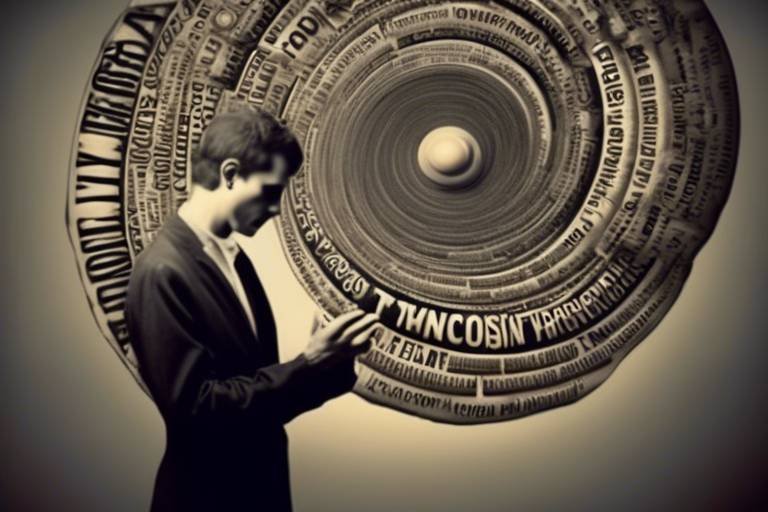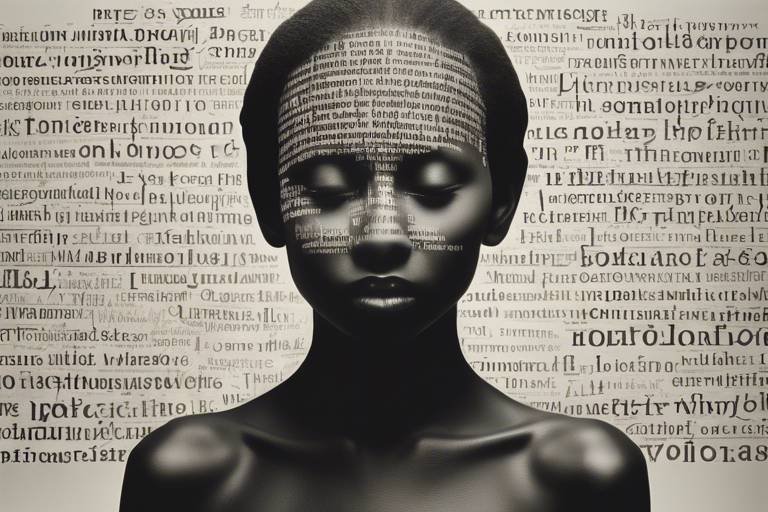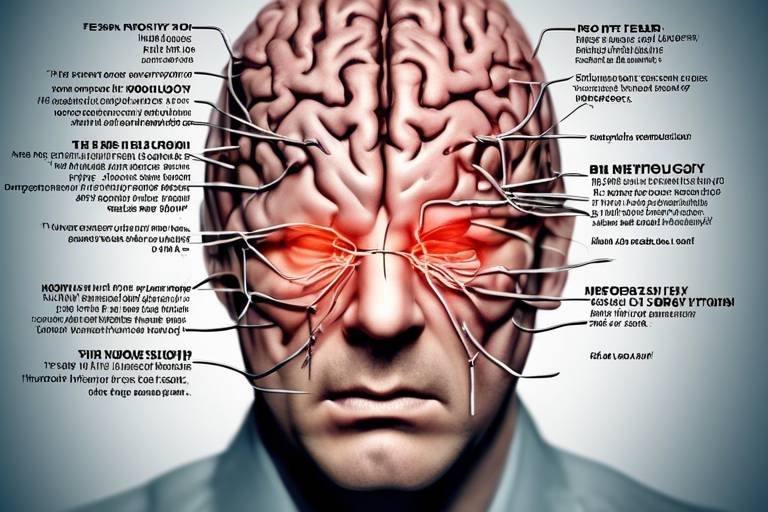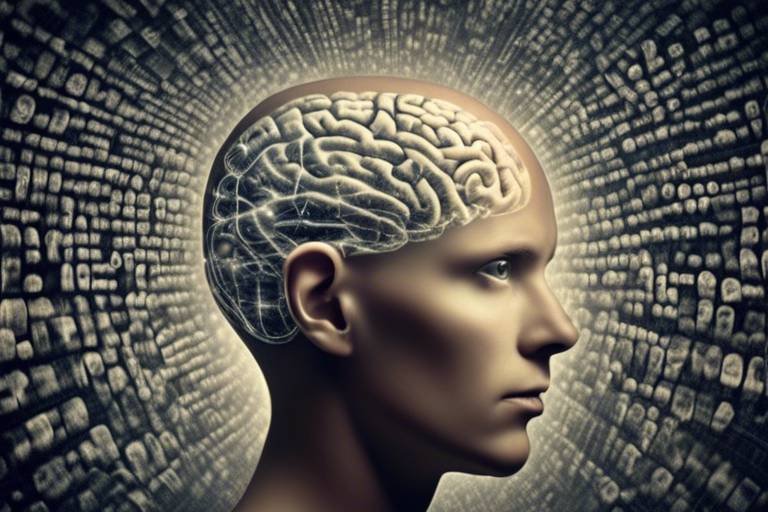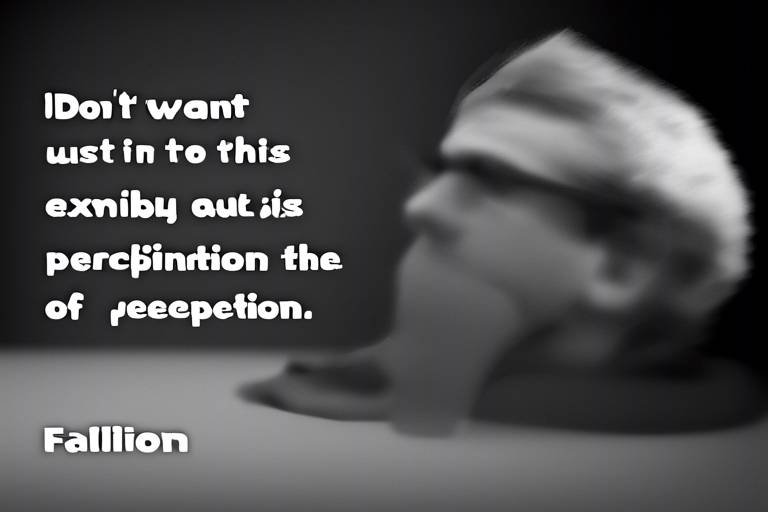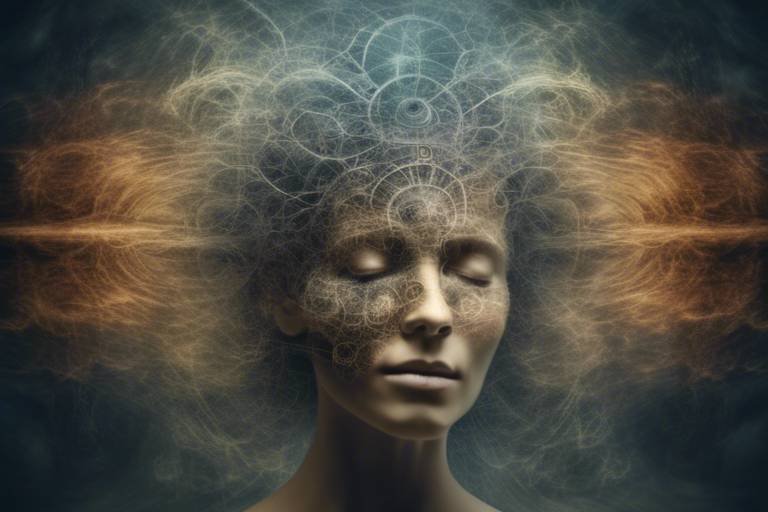Consciousness - The Ultimate Reality
Have you ever paused for a moment and wondered, "What is consciousness?" It's one of those questions that seems simple at first glance, yet dives deep into the very fabric of our existence. Consciousness isn't just about being awake or aware; it’s the lens through which we experience the world around us. Think of it as the canvas on which our thoughts, emotions, and perceptions are painted. Without it, reality would be a blank slate, devoid of meaning or interpretation.
As we embark on this exploration of consciousness, we'll uncover its profound nature and the implications it holds for understanding reality itself. Imagine consciousness as a vast ocean, with each wave representing a different thought or feeling. The depths of this ocean are filled with mysteries, from the simplest sensations to the most complex philosophical inquiries. This article aims to navigate these waters, shedding light on how consciousness shapes not only our individual experiences but also the collective understanding of existence.
Throughout history, various thinkers, scientists, and philosophers have attempted to unravel the enigma of consciousness. From ancient sages to modern neuroscientists, the quest to understand what it means to be conscious has sparked debates, inspired research, and even led to groundbreaking discoveries. But what does it all mean for us? Are we merely biological machines, or is there something more profound at play? As we delve deeper, we’ll explore different perspectives that challenge our perceptions of reality and consciousness, ultimately asking ourselves: Is consciousness the ultimate reality?
In the upcoming sections, we will dissect the nature of consciousness, examining its characteristics and functions. We'll dive into philosophical perspectives that have shaped our understanding, such as dualism and materialism, and uncover scientific approaches that reveal the biological underpinnings of our conscious experience. By the end of this journey, you may find that consciousness is not just a byproduct of brain activity, but rather a fundamental aspect of existence itself.
- What is consciousness? Consciousness is the state of being aware of and able to think about one's own existence, thoughts, and surroundings.
- Why is consciousness important? It shapes our experiences, influences our perceptions of reality, and is central to our understanding of existence.
- How do scientists study consciousness? Through neuroscience, psychology, and various experimental methods, researchers explore the biological and psychological aspects of consciousness.
- Can consciousness exist outside of the brain? This is a debated topic; while some argue that consciousness is a product of brain activity, others suggest it may have a non-material aspect.

The Nature of Consciousness
Understanding consciousness is like peeling an onion; each layer reveals deeper insights into our experiences, thoughts, and emotions. At its core, consciousness is not just about being awake or aware; it encompasses the entirety of our subjective experiences. Think about it: when you feel joy, sadness, or even confusion, what you're really experiencing is your consciousness interpreting the world around you. This intricate tapestry of awareness shapes how we perceive reality and influences our interactions with others.
One of the most fascinating aspects of consciousness is its characteristics. It is multifaceted, dynamic, and deeply personal. Each individual's consciousness is shaped by a myriad of factors, including culture, upbringing, and personal experiences. This subjectivity is what makes consciousness so intriguing and complex. For instance, two people can witness the same event but have entirely different interpretations and emotional responses based on their unique consciousness. This phenomenon raises compelling questions: Is there a universal consciousness, or is each person's experience entirely isolated?
Moreover, the functions of consciousness extend beyond mere awareness. It plays a crucial role in decision-making, emotional regulation, and even creativity. When we engage in problem-solving, for instance, our consciousness allows us to evaluate options, weigh consequences, and ultimately make choices that reflect our values and desires. This decision-making process is not just a cold calculation; it is infused with our feelings and intuitions, making it a deeply human experience.
In exploring the nature of consciousness, we also encounter its impact on our emotions. Consciousness allows us to process feelings, recognize patterns, and even anticipate future emotional states. It acts as a mirror, reflecting our inner world and providing insights into our motivations and desires. This reflective quality is essential for personal growth, as it encourages us to examine our beliefs and assumptions about ourselves and the world.
To further illustrate the complexities of consciousness, consider the following table that outlines key characteristics:
| Characteristic | Description |
|---|---|
| Subjectivity | Each person's experiences and interpretations are unique. |
| Dynamic Nature | Consciousness evolves and changes over time based on experiences. |
| Integration | Consciousness integrates sensory information, emotions, and thoughts. |
| Reflective | Allows for self-awareness and introspection. |
In summary, consciousness is a profound and intricate phenomenon that shapes our understanding of reality. It is not merely a passive state of being; rather, it actively engages with our environment, influences our emotions, and guides our decisions. As we continue to explore the nature of consciousness, we inevitably delve into deeper questions about existence, perception, and the very fabric of reality itself. This exploration invites us to consider not just what it means to be conscious, but how this consciousness interacts with the world around us.

Philosophical Perspectives
Philosophical perspectives on consciousness delve into the intricate relationship between the mind and the body, offering a rich tapestry of ideas that challenge our understanding of reality. At the heart of these discussions lie two dominant schools of thought: dualism and materialism. Each proposes a distinct view on how consciousness interacts with the physical world, raising profound questions about the essence of existence itself. Have you ever pondered whether your thoughts are merely the byproducts of brain activity, or if they represent something more profound? This is where the philosophical debate begins.
Dualism, famously championed by René Descartes, posits that the mind and body are fundamentally different substances. Descartes famously stated, "I think, therefore I am," suggesting that the act of thinking is proof of our existence as conscious beings. This perspective implies that consciousness is a non-physical entity that interacts with the physical body. Such a viewpoint raises significant implications for how we understand our experiences and the nature of reality. It leads us to consider whether consciousness can exist independently of the physical body, much like a ghost inhabiting a vessel.
On the other side of the spectrum lies materialism, which argues that everything about consciousness can be explained through physical processes. This view challenges the notion of a separate mind by suggesting that our thoughts, feelings, and experiences arise solely from the workings of the brain. Imagine consciousness as a complex software program running on the hardware of the brain; if we can understand the program, we can understand the mind. This perspective invites us to explore the biological underpinnings of our thoughts and emotions, leading to a more empirical understanding of reality.
The ongoing debate between dualism and materialism is not just academic; it has real-world implications for how we perceive ourselves and our place in the universe. For instance, if dualism holds true, we might view ourselves as more than mere biological machines, potentially opening the door to concepts like the afterlife or spiritual existence. Conversely, if materialism prevails, it could lead to a more deterministic view of human behavior, suggesting that our choices are merely the result of neural processes.
To further illustrate the contrasts between these two perspectives, consider the following table:
| Aspect | Dualism | Materialism |
|---|---|---|
| Mind-Body Relationship | Distinct entities | Unified system |
| Nature of Consciousness | Non-physical | Physical process |
| Implications for Existence | Possibility of afterlife | Deterministic view |
In addition to dualism and materialism, other philosophical perspectives also contribute to the dialogue about consciousness. Phenomenology, for example, emphasizes the subjective experience of consciousness. It encourages us to pay attention to how we perceive the world around us, highlighting that our individual experiences shape our understanding of reality. This approach suggests that consciousness is not merely a passive receiver of information but an active participant in constructing our reality.
Ultimately, the philosophical exploration of consciousness invites us to question our assumptions about existence. Are we merely biological entities, or do we possess a deeper essence that transcends the physical? The answers to these questions may not be definitive, but they encourage us to think critically about the very nature of our being.
- What is dualism? Dualism is the philosophical view that the mind and body are distinct entities, each with its own properties.
- What is materialism? Materialism posits that everything, including consciousness, can be explained by physical processes and interactions.
- How does phenomenology relate to consciousness? Phenomenology focuses on subjective experiences, emphasizing how personal perception shapes our understanding of reality.
- Why is the mind-body relationship significant? Understanding this relationship influences how we interpret consciousness, existence, and our place in the universe.

Dualism vs. Materialism
The debate between dualism and materialism is a cornerstone of philosophical inquiry into the nature of consciousness. At its core, this discussion revolves around the fundamental question: Is consciousness a separate entity from the physical world, or is it merely a byproduct of physical processes? Dualism, famously championed by René Descartes, posits that the mind and body are distinct and fundamentally different substances. This perspective suggests that our mental experiences—thoughts, emotions, and perceptions—exist independently of our physical being. Imagine consciousness as a ghostly figure, floating freely, interacting with the physical world but not confined by it. This view raises compelling implications about the afterlife and the essence of human existence beyond mere biological functions.
On the other hand, materialism presents a starkly different viewpoint. Materialists argue that everything about consciousness can be explained through physical processes, particularly those occurring within the brain. According to this perspective, thoughts and feelings are nothing more than complex interactions of neurons and chemicals. Think of it like a sophisticated computer program; the hardware (the brain) runs the software (consciousness), and without the hardware, the software ceases to exist. This view challenges the notion of a non-material mind and suggests that consciousness is intricately tied to our biological makeup.
To further illustrate the differences between these two perspectives, consider the following table:
| Aspect | Dualism | Materialism |
|---|---|---|
| Nature of Mind | Non-physical entity | Physical process |
| Mind-Body Relationship | Distinct and separate | Interdependent |
| Implications for Existence | Potential for an afterlife | Consciousness ends with death |
This philosophical tug-of-war between dualism and materialism invites us to reflect on our understanding of reality itself. If consciousness is indeed a separate entity, then what does that imply about our experiences and the nature of existence? Conversely, if it is merely a product of physical processes, how do we account for the richness of human experience? This dichotomy does not just remain a theoretical debate; it influences various fields, including psychology, neuroscience, and even ethics.
As we navigate through these complex ideas, we must also consider how they impact our daily lives. The way we view consciousness can shape our beliefs, our interactions with others, and our understanding of our own minds. Are we simply biological machines, or is there something more profound at play? This question, though deeply philosophical, resonates with each of us on a personal level. In the end, whether one leans towards dualism or materialism, the exploration of consciousness remains one of the most intriguing and challenging pursuits in understanding our place in the universe.
- What is dualism? Dualism is the philosophical view that the mind and body are distinct entities, suggesting that consciousness exists separately from physical processes.
- What is materialism? Materialism is the belief that everything, including consciousness, can be explained by physical processes and that mental states are a result of brain activity.
- How do dualism and materialism differ? The primary difference lies in their views on the mind-body relationship; dualism sees them as separate, while materialism views them as interconnected.
- What are the implications of these views? Dualism raises questions about the afterlife and the essence of humanity, while materialism challenges our understanding of consciousness as a purely biological phenomenon.

Descartes' Dualism
René Descartes, a pivotal figure in the realm of philosophy, introduced the concept of dualism, which asserts that the mind and body are two fundamentally different substances. This idea challenges us to reconsider our understanding of consciousness, suggesting that our mental experiences are not merely products of physical processes but rather exist in a separate, non-material realm. Imagine for a moment that your mind is like a conductor leading an orchestra, directing the physical body as if it were a symphony. This metaphor captures the essence of Descartes' view: the mind orchestrates actions and experiences while remaining distinct from the body.
According to Descartes, the mind is characterized by thought, awareness, and the capacity for rationality, while the body is composed of physical matter and operates according to the laws of nature. This distinction raises profound questions about the nature of existence and the relationship between consciousness and reality. If the mind is non-physical, how does it interact with the body? This dilemma is often referred to as the "mind-body problem," and it has sparked extensive debate among philosophers, scientists, and theologians alike.
Descartes famously stated, "Cogito, ergo sum" (I think, therefore I am), emphasizing that the very act of thinking is proof of one's existence. This assertion highlights the primacy of consciousness in understanding reality. For Descartes, the certainty of one's thoughts and experiences serves as a foundation for knowledge, suggesting that our subjective experiences are the most reliable source of understanding the world around us. In this framework, consciousness becomes not just a byproduct of brain activity but a fundamental aspect of what it means to exist.
However, the implications of dualism extend beyond mere philosophical musings. They invite us to explore how this perspective influences various fields, including psychology, cognitive science, and even artificial intelligence. For instance, if consciousness is indeed separate from the physical realm, what does that mean for the development of machines that mimic human thought and behavior? Can a robot ever truly possess consciousness, or will it always remain an imitation?
As we delve deeper into the implications of Descartes' dualism, it becomes essential to consider the criticisms that have emerged over the centuries. Critics argue that dualism creates an unnecessary divide between the mind and body, complicating our understanding of human experience. They advocate for a more integrated approach, suggesting that consciousness arises from complex biological processes within the brain. This perspective aligns with physicalism, which posits that everything, including consciousness, can ultimately be explained through physical science.
In conclusion, Descartes' dualism presents a fascinating yet contentious viewpoint on consciousness. It challenges us to ponder the very nature of our existence, the relationship between mind and matter, and the implications of these ideas for our understanding of reality. As we navigate this intricate landscape, we must remain open to the possibility that consciousness may be far more complex than we can currently comprehend.
- What is Descartes' dualism? Descartes' dualism is the philosophical viewpoint that the mind and body are two distinct substances, with the mind representing consciousness and the body representing physical matter.
- How does dualism relate to consciousness? Dualism suggests that consciousness exists independently of the physical body, raising questions about how the two interact and influence each other.
- What is the mind-body problem? The mind-body problem refers to the philosophical dilemma of understanding how mental states, such as thoughts and feelings, can arise from physical processes in the brain.
- What are the criticisms of dualism? Critics argue that dualism complicates the understanding of human experience by creating an unnecessary divide between mind and body, advocating for a more integrated view of consciousness.

Physicalism's Challenge
Physicalism, a philosophical standpoint that asserts everything, including consciousness, is rooted in the physical realm, presents a significant challenge to our traditional understanding of the mind. Imagine for a moment that consciousness is like a vibrant painting hanging in a gallery; physicalism argues that the canvas and paint are all that exist, dismissing the artistry and emotion that the painting evokes. This perspective compels us to reconsider the very essence of what it means to be aware and to experience life.
At its core, physicalism posits that our thoughts, feelings, and experiences are mere byproducts of physical processes occurring within the brain. This leads to several compelling implications:
- Mind-Body Connection: Physicalism suggests a seamless connection between our mental states and brain activity, implying that every thought corresponds to a neural event.
- Reductionism: It encourages a reductionist view, where complex mental phenomena are broken down into simpler physical components, often leading to questions about the richness of human experience.
- Challenges to Free Will: If our consciousness is merely a product of physical interactions, the notion of free will becomes contentious, raising questions about moral responsibility.
One of the most significant challenges posed by physicalism is its inability to fully explain the subjective quality of experiences, often referred to as "qualia." Consider the experience of tasting chocolate; while physicalism can outline the chemical reactions and brain processes involved, it struggles to encapsulate the *richness* and *depth* of that experience. This leads to the famous philosophical question: how can something as *intangible* as consciousness arise from purely *tangible* processes?
Moreover, physicalism faces criticism for potentially oversimplifying the complexities of human experience. Just as a computer can process data but lacks the emotional depth of a human being, physicalism may overlook the nuances of consciousness that contribute to our understanding of reality. This brings us to a crossroads where science and philosophy must engage in a dialogue to explore the intricate layers of existence.
Ultimately, the challenge of physicalism invites us to dive deeper into the nature of consciousness and its relationship to reality. Are we simply biological machines, or is there more to our existence? As we grapple with these questions, we may find that the answers lie not solely in the realm of science, but also in the rich tapestry of human experience and perception.
- What is physicalism? Physicalism is the view that everything, including consciousness, is fundamentally physical and can be explained through physical processes.
- How does physicalism relate to consciousness? Physicalism posits that consciousness arises from brain activity and is not a separate non-physical entity.
- What are the criticisms of physicalism? Critics argue that physicalism fails to account for the subjective nature of experiences and the richness of human consciousness.
- Can physicalism explain free will? Physicalism raises questions about free will, as it suggests our thoughts and actions are determined by physical processes.

Phenomenology and Consciousness
Phenomenology is a fascinating philosophical approach that dives deep into the realm of subjective experience. It emphasizes the importance of how individuals perceive and interpret their own consciousness, rather than merely focusing on external reality. Imagine for a moment that your consciousness is like a unique lens through which you view the world; this lens is shaped by your personal experiences, emotions, and thoughts. This perspective is crucial because it acknowledges that each person's reality is colored by their own perceptions, which can often diverge significantly from the objective world.
At the heart of phenomenology is the idea that consciousness is not just a passive receiver of information but an active participant in shaping our understanding of reality. Think of it as a canvas where our experiences paint a vivid picture of the world around us. This approach encourages us to explore questions such as: How do our emotions influence our perception? How does memory affect our present experiences? By diving into these inquiries, phenomenology allows us to appreciate the intricate relationship between our consciousness and the reality we perceive.
One of the key figures in phenomenology, Edmund Husserl, introduced the concept of the “lifeworld”, which refers to the world as we experience it in our everyday lives. This idea suggests that our consciousness is deeply embedded in our social and cultural contexts, making it impossible to separate our subjective experiences from the realities we inhabit. In this sense, phenomenology serves as a bridge between the inner workings of the mind and the external world, highlighting how our consciousness interacts with and shapes our reality.
Furthermore, phenomenology invites us to engage in a process called “bracketing”, which involves setting aside preconceived notions and judgments to fully immerse ourselves in the experience at hand. This practice can lead to a deeper understanding of our consciousness, allowing us to appreciate the richness of our perceptions without the interference of external biases. Imagine peeling back the layers of an onion; each layer reveals a new aspect of your experience, helping you uncover the essence of your consciousness.
In conclusion, phenomenology offers a profound framework for understanding consciousness by emphasizing the significance of personal perception. It challenges us to consider how our unique experiences shape our reality and encourages a deeper exploration of the interplay between mind and world. By embracing this approach, we can gain valuable insights into the nature of consciousness and its pivotal role in defining our existence.
- What is phenomenology? Phenomenology is a philosophical approach that studies subjective experiences and how they shape our understanding of reality.
- Who is the founder of phenomenology? Edmund Husserl is considered the founder of phenomenology, emphasizing the importance of personal perception.
- How does phenomenology relate to consciousness? Phenomenology explores how consciousness actively shapes our experiences and perceptions of the world.
- What is the "lifeworld" concept? The "lifeworld" refers to the world as experienced in everyday life, highlighting the influence of social and cultural contexts on consciousness.

Scientific Approaches
When we dive into the realm of to consciousness, we're stepping into a fascinating world where biology, psychology, and technology intersect. Neuroscience has become a pivotal field in this exploration, providing us with empirical insights that illuminate how our brains produce the rich tapestry of conscious experience. Imagine your brain as a complex orchestra, with each neuron playing its part to create the symphony of thoughts, feelings, and perceptions that define our reality. The more we learn about this orchestra, the clearer the picture of consciousness becomes.
One of the most intriguing aspects of neuroscience is its focus on the biological basis of consciousness. Researchers employ advanced imaging techniques, like functional Magnetic Resonance Imaging (fMRI), to observe brain activity in real-time. This allows scientists to correlate specific patterns of neural activity with conscious experiences. For instance, when you think about your favorite song, certain areas of your brain light up, showcasing the intricate relationship between neural processes and subjective awareness. This interplay raises questions about whether consciousness is merely a byproduct of physical processes or something more profound.
Furthermore, the study of consciousness isn't limited to just the physical brain. Psychologists examine how consciousness manifests in behavior and cognition. They explore concepts such as attention, perception, and memory, which are crucial for understanding how we interact with the world. For example, consider how our attention can shape our conscious experience; when we focus intently on something, we may completely miss out on other stimuli around us, like the classic "invisible gorilla" experiment. This highlights the selective nature of consciousness and how it can be influenced by various factors.
Moreover, the intersection of consciousness and quantum physics adds another layer of complexity to our understanding. Some interpretations of quantum mechanics suggest that consciousness may play a fundamental role in shaping reality itself. This idea is both captivating and controversial, prompting discussions among scientists and philosophers alike. It's as if we're standing at the edge of a vast ocean of possibilities, contemplating whether our minds can truly influence the fabric of the universe.
In summary, the scientific approaches to consciousness encompass a wide array of disciplines and methodologies. By examining the biological underpinnings, psychological implications, and even the quantum connections, we gain a deeper understanding of what consciousness is and how it shapes our experience of reality. As we continue to explore these avenues, we may uncover even more profound insights, challenging our perceptions and expanding our understanding of existence.
- What is consciousness? Consciousness is the state of being aware of and able to think about one's own existence, thoughts, and surroundings.
- How do scientists study consciousness? Scientists study consciousness through various methods, including brain imaging techniques, psychological experiments, and philosophical inquiry.
- What role does the brain play in consciousness? The brain is crucial for consciousness, as it processes information and generates our thoughts, emotions, and perceptions.
- Can consciousness exist independently of the brain? This is a debated topic; some argue for dualism, while others support physicalism, which states that consciousness arises solely from brain activity.
- How does quantum physics relate to consciousness? Some interpretations of quantum mechanics suggest that consciousness may influence the behavior of particles, leading to discussions about the interconnectedness of mind and matter.

The Brain and Consciousness
When we dive into the intricate relationship between , we find ourselves at the intersection of biology, psychology, and philosophy. The brain, that marvelous organ encased in our skulls, is not just a collection of neurons firing away; it's the very seat of our thoughts, emotions, and experiences. But how does this complex network translate into the rich tapestry of consciousness that defines our reality? It's a question that has puzzled scientists and thinkers for centuries.
Research in neuroscience has made significant strides in uncovering the mechanisms behind consciousness. Studies utilizing advanced imaging techniques, such as fMRI (functional Magnetic Resonance Imaging), have allowed us to observe the brain in action. These studies reveal that specific areas of the brain are activated during different conscious experiences. For instance, when you engage in deep thought, your prefrontal cortex lights up, while emotional responses might engage the amygdala. This correlation suggests that consciousness is not a singular entity but rather a dynamic interplay of various brain functions.
One fascinating aspect of this relationship is the concept of neural correlates of consciousness (NCC). NCC refers to the minimal set of neural events that are sufficient for a specific conscious experience. Understanding NCC helps researchers pinpoint which brain activities correspond with particular states of awareness. For example, the perception of color might be linked to activity in the V4 area of the visual cortex. However, the challenge remains: while we can identify these correlations, the question of how these neural activities produce subjective experiences—what it feels like to see red, for instance—remains elusive.
Moreover, the brain's plasticity plays a crucial role in shaping consciousness. Our experiences can physically alter the structure and function of the brain, a phenomenon known as neuroplasticity. This adaptability means that our consciousness is not a static entity; it evolves based on our interactions with the world. Think of it like a river that carves its path over time—each experience, each thought reshapes the flow of our consciousness.
In addition to these biological insights, there are intriguing connections between consciousness and quantum physics. Some theories propose that consciousness could influence quantum processes, suggesting a deeper, interconnected reality where mind and matter are not as separate as they seem. This idea challenges traditional notions of consciousness as merely a byproduct of brain activity and opens up a realm of possibilities that intertwine science and philosophy.
Ultimately, the exploration of the brain and consciousness is a journey filled with questions and mysteries. As we continue to peel back the layers of understanding, we find that consciousness is not just a byproduct of biological processes but a profound aspect of our existence that shapes our reality in ways we are only beginning to comprehend.
- What is the relationship between the brain and consciousness?
The brain is the physical organ responsible for producing consciousness, with various regions activating during different conscious experiences. - Can consciousness exist without the brain?
This is a debated topic; while some philosophies argue for a dualistic view, scientific perspectives generally see consciousness as arising from brain activity. - How does neuroplasticity affect consciousness?
Neuroplasticity allows the brain to adapt and change based on experiences, which in turn can alter one's conscious awareness and perceptions. - What are neural correlates of consciousness?
NCC are the specific brain activities that correspond to particular conscious experiences, helping researchers understand how consciousness is manifested in the brain.

Consciousness in Quantum Physics
The relationship between consciousness and quantum physics is a captivating topic that has intrigued scientists and philosophers alike. At its core, quantum physics challenges our traditional understanding of reality, suggesting that the observer plays a crucial role in shaping the universe. This notion leads us to ponder: could consciousness itself be a fundamental component of the fabric of reality?
One of the most famous interpretations of quantum mechanics is the Copenhagen interpretation, proposed by physicists like Niels Bohr and Werner Heisenberg. This theory posits that particles exist in a state of probability until they are observed, at which point they collapse into a definite state. This idea raises a tantalizing question: does the act of observation require a conscious observer? If so, does this imply that our consciousness is intertwined with the very essence of reality?
To delve deeper, let’s explore some key theories and concepts that illustrate the intriguing intersection of consciousness and quantum physics:
- Observer Effect: This phenomenon suggests that the act of measuring a quantum system inevitably alters its state. It leads to the question of whether consciousness itself influences the outcome of quantum events.
- Quantum Entanglement: This concept describes how particles can become linked, such that the state of one instantly influences the state of another, regardless of distance. Some theorists propose that consciousness might play a role in this interconnectedness.
- Many-Worlds Interpretation: This interpretation suggests that all possible outcomes of quantum measurements actually occur, each in its own separate universe. This raises profound questions about the nature of reality and the role of consciousness in experiencing these multiple realities.
Additionally, some researchers, like physicist David Bohm, have proposed that consciousness might be an integral aspect of the universe, suggesting a deeper connection between mind and matter. Bohm's theory of implicate order posits that everything is interconnected, and consciousness is a fundamental part of this interconnectedness, acting as a bridge between the quantum realm and our subjective experiences.
While these theories are still hotly debated, they invite us to reconsider our understanding of consciousness and its implications for reality. Are we merely passive observers in a deterministic universe, or do our conscious choices actively shape the world around us? This profound inquiry not only challenges our perceptions of existence but also encourages us to explore the mysteries of the universe with a sense of wonder and curiosity.
As we continue to investigate the enigmatic relationship between consciousness and quantum physics, we may find ourselves on the brink of a revolutionary understanding of both our minds and the universe itself. The implications of this exploration could redefine not only science but also the very nature of our existence.
- What is the observer effect in quantum physics?
The observer effect refers to the phenomenon where the act of observing a quantum system alters its state, suggesting that consciousness may play a role in determining reality. - How does consciousness relate to quantum entanglement?
Quantum entanglement describes a connection between particles that transcends distance, leading some theorists to propose that consciousness might influence this interconnectedness. - What is the Many-Worlds interpretation?
This interpretation of quantum mechanics suggests that all possible outcomes of quantum events occur in separate, parallel universes, raising questions about the nature of reality and consciousness. - Can consciousness influence quantum events?
This is a contentious topic in physics, with some theories suggesting that consciousness may indeed have an impact on quantum measurements.

Consciousness and Reality
When we dive into the intricate relationship between consciousness and reality, we find ourselves navigating a labyrinth of questions that challenge our very understanding of existence. What is reality, after all? Is it a fixed construct that exists independently of our minds, or is it a fluid tapestry woven from our perceptions and experiences? This inquiry is not just philosophical; it has profound implications for how we live our lives and understand our place in the universe.
At first glance, one might assume that reality is an objective truth, something we can measure and observe. However, when we consider the subjective nature of consciousness, we begin to see how our individual experiences shape our understanding of the world. For instance, two people can witness the same event, yet their interpretations and emotional responses can differ dramatically. This phenomenon leads us to ponder: Is reality merely a reflection of our consciousness?
To illustrate this point, consider the following scenarios:
- Color Perception: Take the color red. To one person, it might evoke feelings of love and warmth, while to another, it could symbolize danger and caution. Both perceptions are valid, yet they highlight how consciousness colors our interpretation of reality.
- Memory Interpretation: Memories are another area where consciousness plays a pivotal role. Two friends might recall a shared experience in vastly different ways, influenced by their emotions and mental states at the time of the event.
This subjective experience leads us to the crux of the matter: the distinction between subjective and objective reality. Subjective reality is shaped by personal experiences, emotions, and thoughts, while objective reality exists independently of our perceptions. But can we ever truly access objective reality, or are we forever confined to our subjective interpretations?
Furthermore, the role of awareness cannot be overlooked in this discussion. Awareness acts as a lens through which we perceive reality. The more aware we are of our thoughts and feelings, the more we can navigate our experiences with clarity. This heightened awareness not only influences how we interact with our environment but also shapes our beliefs and decisions. For example, a person who practices mindfulness may experience the world in a more vivid and meaningful way compared to someone who is perpetually distracted.
As we explore the relationship between consciousness and reality, we must also consider the concept of interconnectedness. Many philosophical and scientific perspectives suggest that consciousness is not an isolated phenomenon but rather part of a larger web of existence. This idea resonates with various spiritual traditions that emphasize unity and the interconnected nature of all beings. If consciousness is indeed interconnected, then our individual experiences may contribute to a collective understanding of reality.
In conclusion, the relationship between consciousness and reality is complex and multifaceted. It challenges us to rethink our assumptions about existence and encourages us to explore the depths of our own consciousness. As we continue to unravel these mysteries, we may find that the key to understanding reality lies not in objective measurements, but in the rich tapestry of our subjective experiences.
- What is the difference between consciousness and awareness?
Consciousness refers to the state of being aware of and able to think about one's own existence, thoughts, and surroundings. Awareness, on the other hand, is the ability to perceive and respond to stimuli in the environment, which can be seen as a component of consciousness.
- Can consciousness exist without a physical body?
This is a hotly debated topic. Some philosophical perspectives, like dualism, argue that consciousness can exist independently of the body, while materialist views contend that consciousness arises solely from physical processes in the brain.
- How does consciousness affect our perception of reality?
Consciousness shapes our perception of reality by filtering and interpreting sensory information based on our past experiences, beliefs, and emotions, leading to a subjective understanding of the world around us.

Subjective vs. Objective Reality
When we delve into the concept of reality, we often encounter the intriguing dichotomy between subjective and objective reality. But what does this mean, and why should we care? To put it simply, subjective reality refers to the personal experiences and perceptions that shape an individual's understanding of the world, while objective reality is the external world that exists independently of our thoughts and feelings. Imagine standing in front of a beautiful sunset; while the colors and emotions you feel are uniquely yours, the sunset itself is an event occurring in the physical world, regardless of who is observing it.
This distinction is crucial because it highlights how our consciousness plays a pivotal role in interpreting what we perceive. Our beliefs, emotions, and past experiences color our understanding of reality, which can lead to vastly different interpretations of the same situation. For instance, two friends watching the same movie may walk away with entirely different feelings about it. One might find it hilarious, while the other sees it as dull. This divergence stems from their unique subjective realities.
Moreover, the interplay between subjective and objective reality raises profound questions about the nature of existence itself. Are we merely passive observers of a fixed reality, or do we actively shape our experiences through our consciousness? This is where the philosophical musings of figures like Immanuel Kant come into play. Kant argued that our understanding of the world is mediated by our senses and cognitive frameworks, suggesting that what we perceive is not the world as it is, but rather as we are capable of understanding it.
To further illustrate this concept, let's consider a simple table that outlines the differences between subjective and objective reality:
| Aspect | Subjective Reality | Objective Reality |
|---|---|---|
| Definition | Personal perceptions and experiences | External world independent of perception |
| Influence | Shaped by emotions, beliefs, and past experiences | Exists regardless of individual beliefs |
| Examples | Individual reactions to art, personal memories | Physical laws, natural events |
As we explore these themes, it's essential to recognize that our subjective experiences can significantly influence our understanding of objective reality. This influence can be both enlightening and misleading. For instance, someone who has experienced trauma may perceive certain situations as threatening, even when they are not. This subjective lens can distort their interaction with the world, leading to a reality that feels very different from that of someone without similar experiences.
Ultimately, the dance between subjective and objective reality invites us to reflect on our perceptions and the ways they shape our interactions with the world. It encourages us to be mindful of our biases and to appreciate the richness of diverse perspectives. By doing so, we can cultivate a deeper understanding of both ourselves and the world around us, navigating the complexities of existence with greater awareness.
- What is subjective reality? Subjective reality refers to the personal interpretations and experiences of individuals that shape their understanding of the world.
- How does objective reality differ from subjective reality? Objective reality exists independently of individual perceptions and beliefs, while subjective reality is influenced by personal experiences.
- Can subjective reality affect our interactions with others? Yes, our unique perspectives can shape how we interpret situations and interact with others, sometimes leading to misunderstandings.
- Why is it important to understand the difference between subjective and objective reality? Understanding this difference helps us appreciate diverse perspectives and become more aware of our biases in interpreting the world.

The Role of Awareness
Awareness is like the spotlight that illuminates our experiences, allowing us to navigate through the complex tapestry of life. Imagine walking into a dark room; without light, you stumble and struggle to find your way. Similarly, without awareness, we can easily lose track of our thoughts, emotions, and surroundings. It is this awareness that shapes our perceptions and ultimately influences our understanding of reality. But what exactly does it mean to be aware? Is it merely a passive observation, or is it something more profound?
To put it simply, awareness is the state of being conscious of something within oneself or in the environment. This consciousness can be divided into several layers, each contributing to how we interact with the world. For instance, we may have:
- Self-awareness: This involves recognizing one's own thoughts, feelings, and motivations. It’s like having a mirror that reflects not just your physical appearance but also your inner self.
- Environmental awareness: This is the ability to perceive and understand the world around us. It’s akin to being a detective, piecing together clues from our surroundings to make sense of our reality.
- Social awareness: This refers to understanding social cues and the emotions of others. Imagine being at a party and sensing when someone feels out of place; that’s social awareness at work.
These layers of awareness are interconnected, influencing how we perceive and respond to our experiences. For example, heightened self-awareness can lead to better emotional regulation, allowing us to respond to situations rather than react impulsively. On the other hand, being aware of our environment can enhance our decision-making skills, as we become more attuned to the nuances of our surroundings.
Moreover, awareness plays a crucial role in shaping our beliefs and values. When we are aware of our thoughts and feelings, we can challenge negative patterns and cultivate a more positive mindset. This process of self-reflection can lead to significant personal growth and transformation. It’s like tending to a garden; without awareness, weeds can overtake the beautiful flowers of our potential.
Interestingly, awareness is not just a mental exercise; it has profound implications for our physical and emotional well-being. Numerous studies have shown that practices like mindfulness and meditation, which foster awareness, can lead to reduced stress, improved focus, and enhanced emotional resilience. This suggests that being aware is not merely a philosophical concept but a practical tool for navigating the complexities of life.
In conclusion, awareness is the lens through which we view our reality. It allows us to connect with ourselves, understand our environment, and interact with others more meaningfully. By cultivating awareness, we can enhance our experiences, make informed choices, and ultimately lead a more fulfilling life. So, the next time you find yourself lost in thought or overwhelmed by the chaos of life, take a moment to pause and become aware. You might just find that the answers you seek are already within you.
- What is the difference between awareness and consciousness?
A: Awareness refers to the recognition of thoughts, feelings, and surroundings, while consciousness encompasses a broader state of being that includes awareness and the ability to experience and respond to stimuli. - How can I improve my awareness?
A: Practices such as mindfulness meditation, journaling, and self-reflection can help enhance your awareness and deepen your understanding of your thoughts and emotions. - Can awareness impact my mental health?
A: Yes, increased awareness can lead to better emotional regulation, reduced stress, and improved overall mental health by allowing individuals to recognize and address negative thought patterns.
Frequently Asked Questions
- What is consciousness?
Consciousness is the state of being aware of and able to think about one's own existence, thoughts, and surroundings. It's like the spotlight in a theater that illuminates your thoughts and experiences, helping you navigate through reality.
- How does consciousness relate to reality?
The relationship between consciousness and reality is complex. Some argue that consciousness shapes our perception of reality, while others believe that reality exists independently of our awareness. Think of it as a dance between the observer and the observed, where each influences the other.
- What are the main philosophical perspectives on consciousness?
Philosophical perspectives on consciousness include dualism, which posits that the mind and body are separate, and materialism, which argues that consciousness arises from physical processes. It's like debating whether a painting is merely colors on canvas or if it holds deeper meaning beyond the surface.
- What is dualism?
Dualism, famously advocated by René Descartes, suggests that the mind and body are distinct entities. This view raises intriguing questions about the nature of consciousness and whether it can exist independently of the physical body, much like a ghost in a machine.
- What is physicalism?
Physicalism challenges dualism by asserting that consciousness is entirely the result of physical processes in the brain. This perspective redefines our understanding of reality, suggesting that everything, including thoughts and feelings, can be traced back to neural activity.
- How does neuroscience study consciousness?
Neuroscience examines how brain activity correlates with conscious experiences, using techniques like brain imaging to uncover the intricate connections between neural processes and our awareness. It's like being a detective, piecing together clues to understand the mind's workings.
- What role does awareness play in consciousness?
Awareness is central to consciousness, influencing how we perceive and interact with our environment. It shapes our experiences and beliefs, acting as a lens through which we view the world. Imagine it as a filter that colors your perception of reality.
- Can consciousness affect the physical world?
Some interpretations of quantum physics suggest that consciousness might play a role in shaping reality. This idea opens up fascinating discussions about the interconnectedness of mind and matter, like a ripple effect where thoughts can influence outcomes.
- What is phenomenology?
Phemenology focuses on subjective experiences, highlighting the importance of personal perception in understanding consciousness. It's about diving deep into your own experiences to grasp how they shape your reality, much like exploring the depths of an ocean to discover hidden treasures.
- Is reality subjective or objective?
The debate between subjective and objective reality examines whether our experiences shape reality or if an objective reality exists independently of our perceptions. It's a bit like asking whether the glass is half full or half empty—both perspectives hold truth depending on how you view it.




